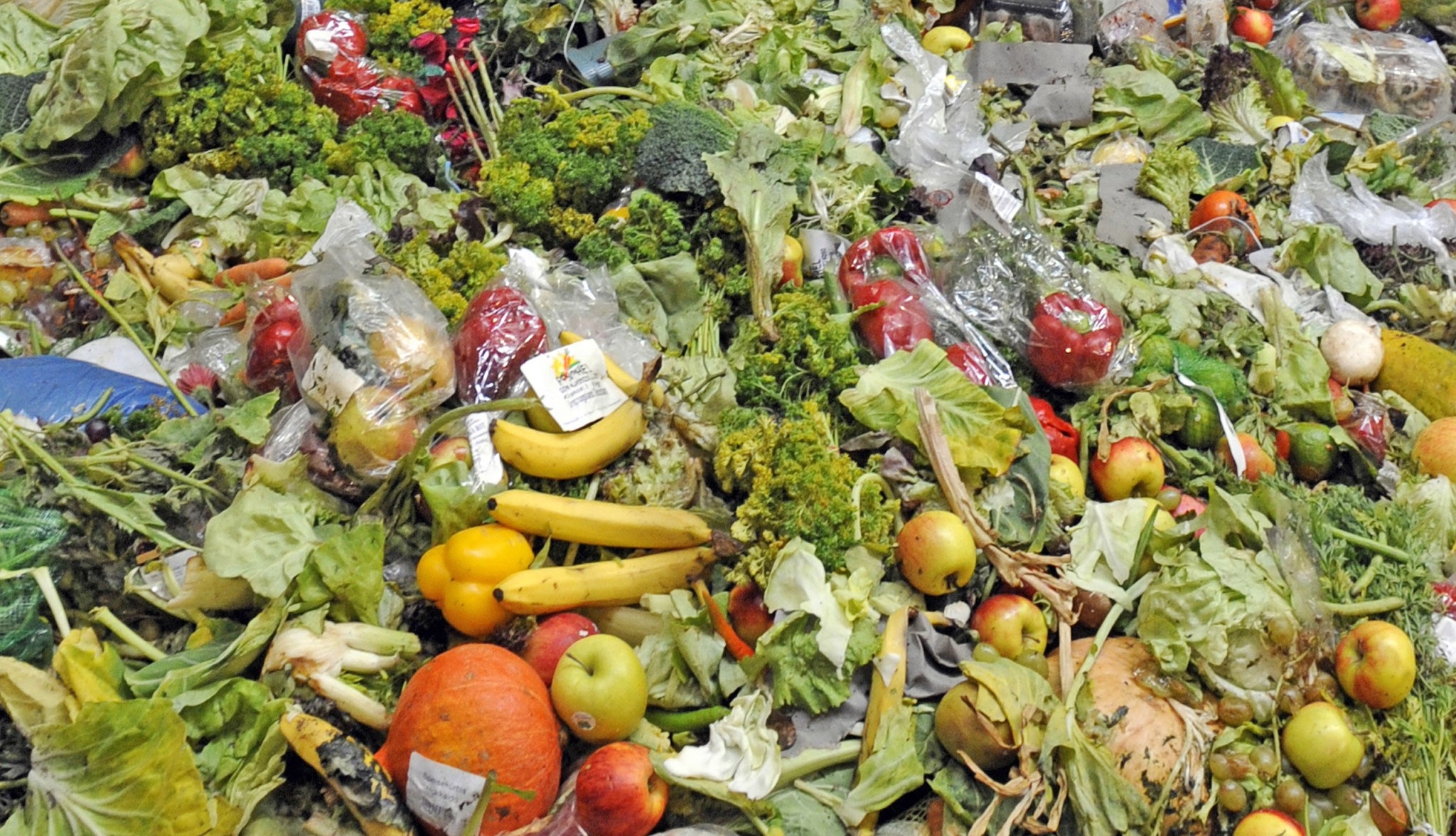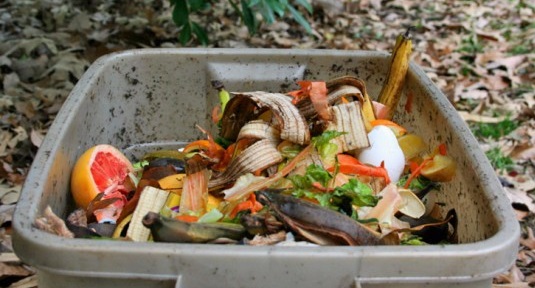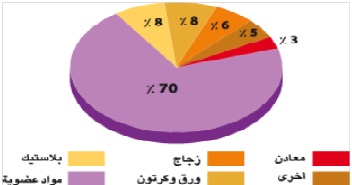Waste… Palestine’s Wasted Wealth
Waste… Palestine’s Wasted Wealth
Palestine loses millions of Shekels annually because Palestinians do not utilize serious exploitation of solid waste. According to some estimations, only 1% of the solid waste is recycled in the West Bank and Gaza, which amounts to around 850 thousand tons each year. However, this recycling is usually done through individual initiatives, or small projects.

Ramallah- Palestine Economy Portal | Asma Marzouq- Specialist in environmental matters, George Karzam, believes that recycling waste is a financially viable process, which would increase the productivity of the natural resources; therefore increasing the gross domestic product. He explains: 60-70% of the waste in Palestine are organic materials that can be transformed into high quality Compost (Organic fertilizer), with low expenses, simple techniques, and large returns. In addition, 16% of cartoon, paper, and plastic can also be recycled without any high costs.
Treasures of Waste
Karzam adds: recycling projects create large employment opportunities. For example, burying one thousand tons of dry waste (metal, plastic, glass, and paper) creates an average of 17 job opportunities; while recycling the same amount of waste creates an average of 25 job opportunities, which means a 47% increase.
However, Karzam asserts that the most important return is the environmental and health viability. Random burial of waste will create an environmental disaster years later, represented in the diseases that would be created by the solid waste landfill sites that are close to the residential areas, and which have limited absorptive capacity. In addition, continuing to use the burial policy will contaminate groundwater basins, according to Karzam.
Individual Initiatives
Two years ago, Eman, a Palestinian from Ramoun village to the east of Ramallah, stopped throwing away most of the waste generated from her house. She recycles kitchen waste into organic fertilizers, by separating and putting it in a covered barrel, and in a simple technique where the bacteria decomposes the waste and ferments it, thus transforming it into organic fertilizers that enrich the soil and increase its productivity.
Eman says that she has picked up the idea from the internet; “Currently, I depend a lot on the products of my garden’s fruits and vegetables, and I am assured that they are free from the harmful chemical substances and fertilizers that fill the markets. In addition, recycling has spared me the ugly scene of waste in front of my house.”

Ola Oweidi, engineer of renewable energy and environment, says that the idea of recycling is still new to our society. One may find a small project for a lady somewhere, and another workshop for some entrepreneurs, but it is still not a culture, nor a high level investment; although the Environmental Quality Authority is now paying great attention to the issue. She adds: environment projects funded from abroad usually aim at spreading awareness, but do not target the creation of strategic projects, such as recycling.
Oweidi points out that what is available now are workshops for separating waste, especially junk, in several areas such as Hebron. However, the Palestinian market is not benefiting from recycling as it should, for the separated products are sold to Israel at low prices, where they recycle them and sell them back to us at high prices. Oweidi adds: what is worse is that in south West Bank, tons of thousands of junk is recycled in a random manner, that is detrimental to the environment, and is done for the benefit of Israel.
The Environment is Encouraging
Marwan Abu Yaacob, engineer at the Environmental Quality Authority and previous director of the solid waste department, asserts that his organization works in full energy to encourage waste separating and recycling projects, as they have a positive effect on the environment and the economy. However, investment in this sector is absent, according to Abu Yaacob. He explains that we need to create huge projects that are capable of reducing the size of solid waste, and act as a lever to the Palestinian economy.
He adds: There is currently a project in the planning phase for Al-Bireh Municipality, funded by Canadians. However; unfortunately, a distinctive investment project for separating and recycling waste in the Bathan area in Nablus was about to be launched, but was stopped due to disagreements between the municipality and founder company regarding the location of the project.
Projects that Have not Been Completed!
Some environmentalists rejoiced the opening of the first investment company for recycling waste in Palestine, “Tadweer” company, a subsidiary of PADICO, which they began working on 3 years ago, with a capital of three million US Dollars. However, it was soon decided that the company should be closed, before it even started working, after the municipality of Nablus corresponded to the demands of the residents of the area where the company was established, claiming that it would be very harmful to them.
Mr. Abdallah Shaarawi, Director of the Department of Investment and Developing Business at PADICO group, told Palestine Economy Portal: “ Our project was suspended despite its benefit to the environment and the Palestinian economy. We have started this project as part of our corporate responsibility more than being a profitable project, but closing the it cost us huge losses. What happened will make us think twice before cooperating with municipalities, because we have originally taken the approval from the municipality, and now it just cancelled the agreement. However, we are working on moving the project to another location outside Nablus.”
On the other side, the Mayor of Nablus Ghassan Shakaa assured that shutting down the company came as a result of not meeting the legal requirements, in addition to the protests of the residents of the area.

Most of the Waste in Palestine is Organic and Easily Recycled
In Gaza, there was a similar experience where a company for separating and recycling waste to produce organic fertilizers was established in Rafah area, funded by Japan. However, the company was supposed to process 120 tons of waste per day in order to produce large amounts of organic fertilizers, and recycle other waste such as plastic, paper, and metals; but it has reduced its work to the lowest amounts, as there is no possibility for market its products abroad, due to the siege.
Member of the Board of Directors of the project Mr. Ali Barhoum says that Egypt markets have closed their doors to the products of the company, and that even the small amounts of fertilizers that the company currently produces face competition from the Israeli low-price fertilizers.
The World Recycles its Waste
Europe recycles about 40% of its solid waste, and Germany occupies the first rank in the world in separating waste types. In Germany, the ratio of manufacturing waste reaches over 60%, as the German industries process annually what is worth 500 million Euros of raw materials. This amount constitutes only 45% of the production costs, while wages constitute 18% of the costs.
In Israel, which is considered non-advanced in this sector when compared to European countries, they recycle only 18% of solid waste.


